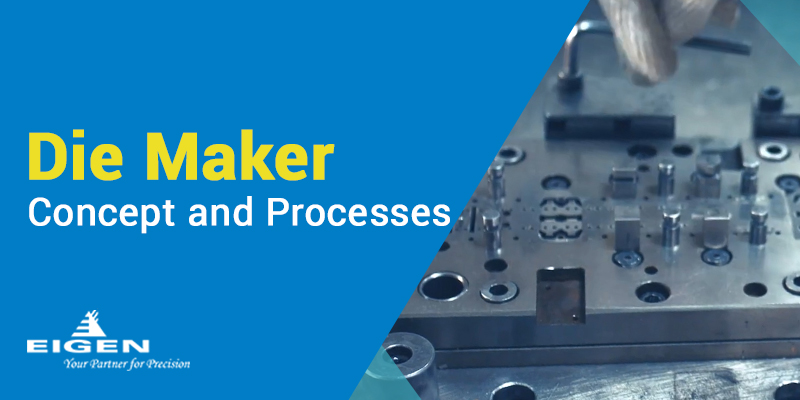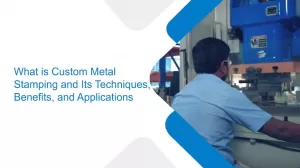Die Maker: Concept and Processes
- Design and Engineering |
- Feb 27, 2020

Die maker are in high demand for several years due to the amount of high skill involved in the work of die manufacturing. To describe their job in a few words, they help produce dies or they are into die manufacturing- as the job title very well mentions. Apart from die manufacturing they also produce tools and machine parts to cater to various types of manufacturing. A large number of professionals carry out both tool and die making; both these processes are different from each other. The main task of tool makers includes making and fixing equipment used in cutting and carving in machines. They also create guiding equipments for these tools that carry out the cutting and make parts that hold these components in the right place. Apart from this, they also produce and repair gauges and other devices that are used in measuring. Die makers, on the other hand, create and also repair dies. These progressive stamping dies are used in the stamping process. Besides this, die makers also progressive stamping dies make molds for a variety of materials like ceramics and plastics.
While it is true that die makers are entrusted with the task of die manufacturing, they still possess a thorough knowledge of machines and how they work. They need to be proficient at maths, understanding blueprints and carrying out accurate work with their hands. Die makers also need to be adept at operating machines like milling machines, grinding machines, lathe machines, and several other hand tools. The job of die makers also involves using devices that are created to measure parameters. Based on the specifications provided or by means of a blueprint, die makers carry out all the steps that are included in producing a die, tool or a fixture. Their work begins by selecting the material from which the progressive stamping dies need to be made. They then carve the material and extract the exact size of piece that is needed to make the die. This requires careful and precise cutting and honing of the carved part. Once the individual part or component is ready, the task of assembling it together to complete the die comes. At times, there could be several parts in a complex die and this requires precise fixing and assembling, else the desired objective will not be carried out. The margin for error in the job of a die maker is extremely low.
Die making is undergoing constant changes. The advent of technology and newer machines have caused die makers to up their game so to speak and learn to make use of these advanced methods to efficiently carry out their task. Ongoing training may be needed to keep abreast of the latest in the field of die making. Modern-day die makers freely use computers to create die designs that are accurate and precise even to the thousandth of an inch. Die makers these days can even write custom programs to facilitate machines to produce the exact size and shape of the custom dies that are needed in a particular manufacturing process.
Die makers can get jobs that suit their profile in a variety of industries including companies that produce metal machinery, automotive production companies, aerospace companies and firms that produce plastic and metal products. There are also freelance die makers or those that work on contracts in plants where metal parts are manufactured.
Educational qualifications for die makers
Typically, four to five years of education and training is needed to become a die maker. There are apprentice programs that include on-the-job training and also courses that cover a variety of skills like designing, programming, reading blueprints and computer mathematics. Those who are eager and quick to learn new skills after having procured a strong base of technical education are able to get themselves hired as firms understand the need for these skills with the die making industry undergoing such constant changes. Completion of technical education and apprenticeship does not mean a full stop. Before a die maker can carry out complex designs and pull intricate job demands, years of meaningful work experience is in order. As in any other industry, the rookies need to learn from those who are seasoned in the field and take their valuable training and experience. There are some die makers who after finishing their technological college training get into operating machines and turn into machinist while skipping their apprenticeship. After this, they take up on-the-job training and other vocational courses to finally become tool and die makers. These options are left to the individual; each person aspiring to become a die maker can choose the path that suits him the best to become a qualified die maker. Upon completion of college education, one needs to be on the lookout for job postings in newspapers and other ads. In certain countries there are state employments offices that release listings of job openings; these include those for a die maker. Apprenticeship is also offered on campus through many colleges which can be helpful in securing a good job eventually.
Scope
The job of a die maker attracts good salary like most skilled work. The demand for skilled die makers is high and the benefits of the job are corresponding. Die makers advance to become tool and die designers. Some even start their own die and tool shops. With years of work experience, they progress to become the head of the department at their firm. Some get an additional college degree and finally become designers and engineers.
Die making is demanding work. As such, those who become die makers should be active, hard workers those who like working with their hands. Good physical health, proper eyesight and a good amount of forbearance is needed in this line of work. Most die makers enjoy the challenges their job poses and become creative at performing their jobs. A die maker also needs to learn how to train younger ones in the field as training is also an integral part of being a good die maker. Die makers use much protective equipment while at work and since their work is different from the actual production of parts using dies, their workplace is less noisy and dirty. Safety standards are required to be followed by die makers while at work to avoid accidents. The job of a die maker is a good one, stable with many benefits.
At Eigen, we possess some of the finest tools and die makers. Our production sites are equipped with the best machinery that produces nothing but the highest quality of parts, satisfying our clients requirements. Dies used in our production plants are made out of the finest quality of materials and our die makers do not compromise on quality standards as they understand that this step is extremely crucial to producing high-quality parts and components. Use our services and experience the high professional standards of our die makers.
Ujjwal handles crucial roles like AGM Marketing, researcher, and is an author for KDDL – Eigen. He currently works with Eigen for implementing proven techniques and strategies for marketing plans on online and offline platforms. An expert in efficiently executing SEO, SEM, email marketing, social media marketing, PR marketing, Print campaigns, etc. Ujjwal has coordinated an efficient marketing team on various creative campaigns and programmatic buying to support various digital cross-promotion efforts. Implement efficient search optimization strategies with the help of collateral material and metrics.
In his former years, Ujjwal has years of experience in a managerial role for several reputed companies. His years of experience combined with the flair of writing help him come up with result oriented strategies for Eigen.




